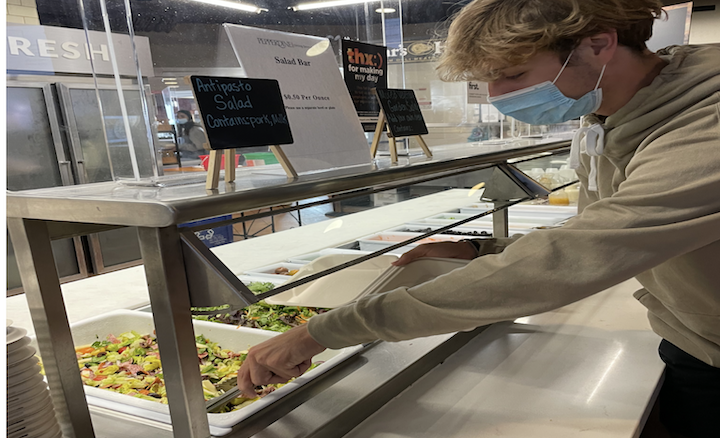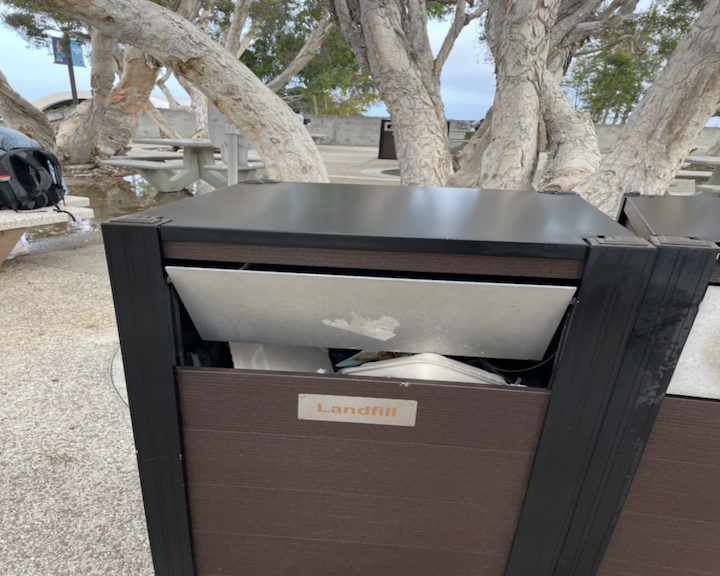
COVID-19 is causing an environmental rollback in Pepperdine’s cafeteria.
Students choose between reusable or disposable utensils and containers when getting food on campus. While the washable dishes are more environmentally friendly, the to-go options offer a more sanitary option, according to Pepperdine’s sustainability website. Efforts to reduce transmission of COVID-19 has raised the environmental footprint of many students.
“I haven’t even thought much about the environmental impact of COVID,” said Lauren Graney, a senior pre-med psychology major. “Everything has been switched to focus on keeping things clean. Environmental reasons kind of got pushed aside and put on hold while the world had to deal with more urgent problems.”
During a Tuesday lunch hour, 160 out of 204 students used to-go boxes with their food. The other 44 students used washable plates or bowls.
Rodney Reed, the resident district manager for Sodexo University Services, said there is an increase in students wanting their items to-go and Sodexo is continuing to provide students with that choice.
The environmental footprint when using disposables
Many items in the cafeteria are recyclable or compostable, Reed said. They do not use Styrofoam or other non-recyclable containers that cause more harm to the environment because they do not break down easily in landfills, according to Environmental Health News. Plastics will stay in landfills for centuries and can put harmful chemicals into the ground.
Although COVID-19 did cause the need for more non-reusable items, Reed said he believes using compostable items lessens the impact on the environment.
If disposed properly, compostable packaging can break down in 90-180 days, according to Compost Connect. Compostable packaging is created out of plant-based renewable materials. Using compostable containers can help to keep products out of landfills, reduce greenhouse gases, be reused, can enhance soil quality and reduce the usage of fossil-fuels.
Paper options are more sustainable than other options, such as plastic. This is due to paper being recyclable, bio-based and typically five times more biodegradable, according to Environmental Health News. Often there is confusion on how to properly dispose of such containers.
Dale Waite, a first-year business major, said he believes many students do not recycle their boxes and many containers end up in the trash.
Getting consumers to recycle paper or cardboard materials correctly is an issue, according to Common Objective, a fashion industry business dedicated to making the world more sustainable.
Some 66% of households in the United Kingdom were unsure of what materials can be recycled, according to a Common Objective study. In the United States, 25-30% of items put into recycling bins are unable to be recycled due to food or substance contamination.
Michaela Gromer, senior psychology major and member of the Green Team, said she believes there is too much plastic used in the cafeteria, such as the non-reusable plastic silverware.
Roughly 400 million tons of plastic is produced every year, according to BBC Newsround. About 40% will only be used once before it ends up as waste. Many plastics can not be recycled and often end up in landfills.
Plastic can also end up in bodies of water and harm the home of many living species, according to BBC Newsround. Approximately eight tons of plastic end up in oceans every year.
Changes from COVID-19
Gromer said she believes that the plastic usage in the cafeteria has gotten worse in the past couple of years.
“Student’s safety has to be prioritized first,” Gromer said. “If the cafeteria is saying we are using less reusable things to increase the safety because of COVID, there is not really an argument there.”
Gromer prioritizes the health of others and would rather see someone wearing a disposable mask than no mask at all.
“Freshman year there were reusable to-go boxes and if you got one it cost a little bit of money, but you could keep reusing them,” Gromer said. “They haven’t brought those boxes back. Freshman year people would even choose not to get those boxes because it was a little bit more of a hassle and get their food on plates instead.”
These containers are known as a “Green Box,” according to Pepperdine’s sustainability website. Created from reusable plastic, they are a more sustainable option to paper-to-go containers. After they are washed and sanitized students can reuse them.
Gromer has yet to see these make a return in the cafeteria this year. She believes this is due to the boxes being reusable and this could be concerning to many during the pandemic. The cafeteria has reverted back to paper-to-go boxes.
Gromer said she sees other changes in the cafeteria contributing to more waste because of COVID-19. Gromer used a reusable cup at Starbucks during her freshman year. Starbucks is currently unable to provide this option due to sanitary concerns revolving around COVID-19. Gromer has also noticed the increase in popularity of sushi, which comes in plastic containers.
Reed said he believes that Los Angeles County and Pepperdine University are handling the COVID procedures correctly. They are keeping items sanitary to protect students, while minimizing the use of non-reusable items. Reed said this is paying off as LA County has some of the lowest COVID transmission rates in the nation.
“Our items and boxes are compostable, so it is a much smaller impact,” Reed said. “But we have seen an increase in to-go options, and we are trying to educate students and trying to give them options to make sure they understand that they can get their food on a plate that can be rewashed without having to go with the to-go box.”

The impact on students
COVID has caused Graney to focus less on sustainability. She has not lived on campus since her first year due to studying abroad as a sophomore and being remote as a junior due to COVID-19. Her first year she said she was busy, so she often took her meals from the cafeteria to-go. If she did have time to eat in the cafeteria, she would eat with regular silverware and plates.
Graney believes the pandemic has made a significant impact on her environmental footprint as well as the rest of the world.
“When COVID first started to hit I got a little skeptical of a lot,” Graney said. “I was cleaning everything then I got skeptical of the reusable masks so I would get the disposable masks, and I use a lot of those still.”
Graney has also seen an increase in reusable silverware.
“Plastic utensils come individually wrapped now and practically everything now does to ensure it is clean.” Graney said. “And then we use them because it is what we are given so I feel like plastic use has definitely been worse.”
Waite said he has never gotten his food at the cafeteria on washable plates or used reusable silverware. He always uses the to-go containers. COVID-19 has made him more cautious of the cleanliness of his surroundings.
Going forward, Waite wants to pay better attention to the items he is using in order to create less waste.
“I definitely see how our world has become more focused on the idea of, ‘just dispose of it,’ Waite said. “Instead of trying to clean it, since it may be contaminated, people just get rid of it.”
Impact on other campuses
Colleges all over the country have experienced many setbacks with their school’s sustainability efforts, according to the research organization Frontiers in Sustainability.
Yale Hospitality has provided two reusable tote bags and one stainless steel water bottle to all students, according to Yale Sustainability. These items help to offset the increased use of non-reusable containers and bags due to COVID-19.
UC Berkeley is using single-use items in the cafeteria for COVID-19 safety reasons, according to Berkeley Sustainability and Carbon Solutions. The school is encouraging sustainability to students in other ways, such as utilizing the clean tap water on campus and requesting recyclable or compostable to-go containers.
Georgetown has been deeply affected by the COVID-19 pandemic, according to Georgetown University. Georgetown officials are looking down the road to the long-term effects of COVID-19 on their sustainability, instead of solely focusing on what to do right now.
Lauren Gies completed the reporting for this story in Jour 241 in Fall 2021 under the supervision of Dr. Christina Littlefield and Dr. Theresa de los Santos. Dr. Littlefield supervised the web version of the story.




